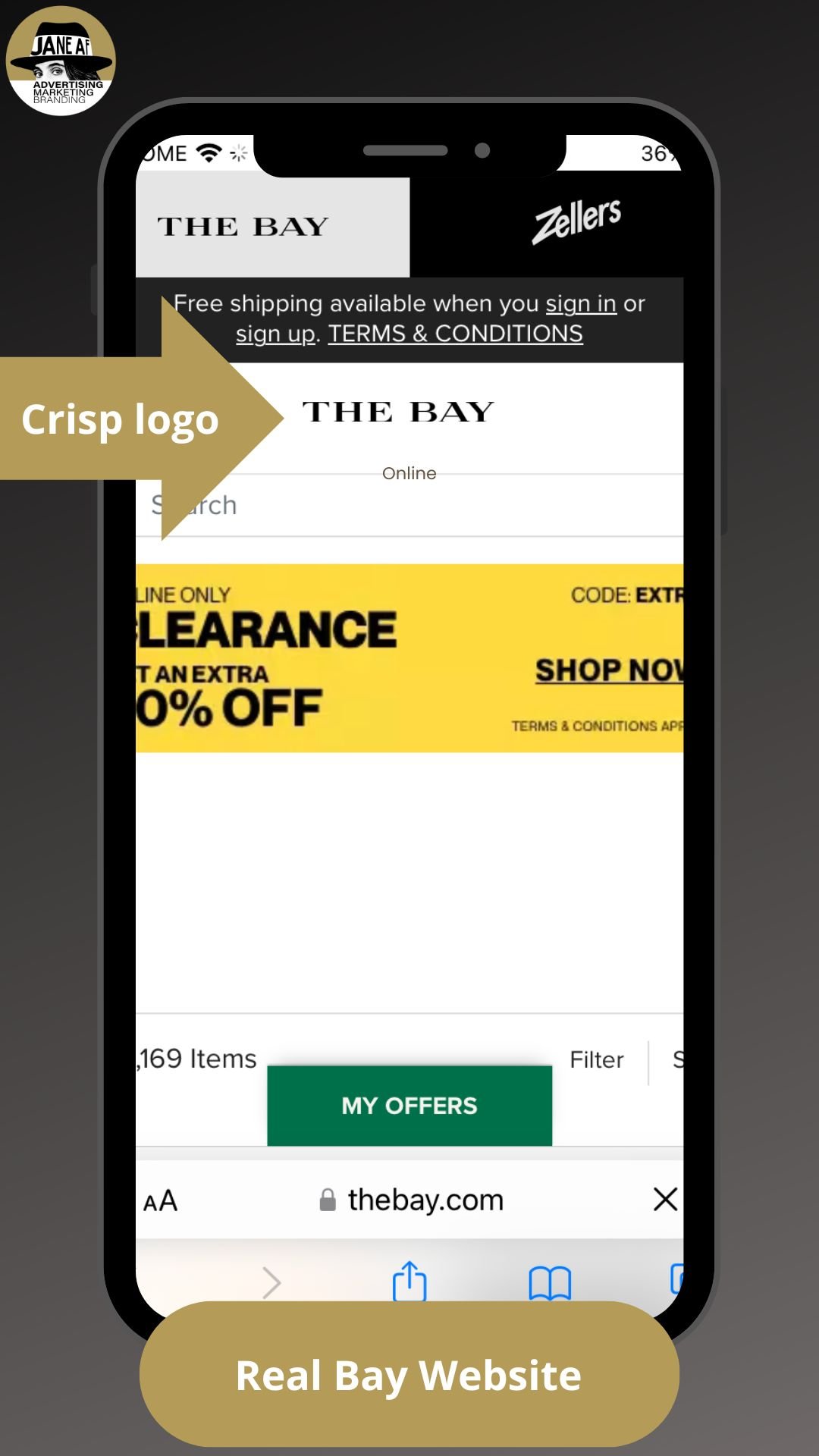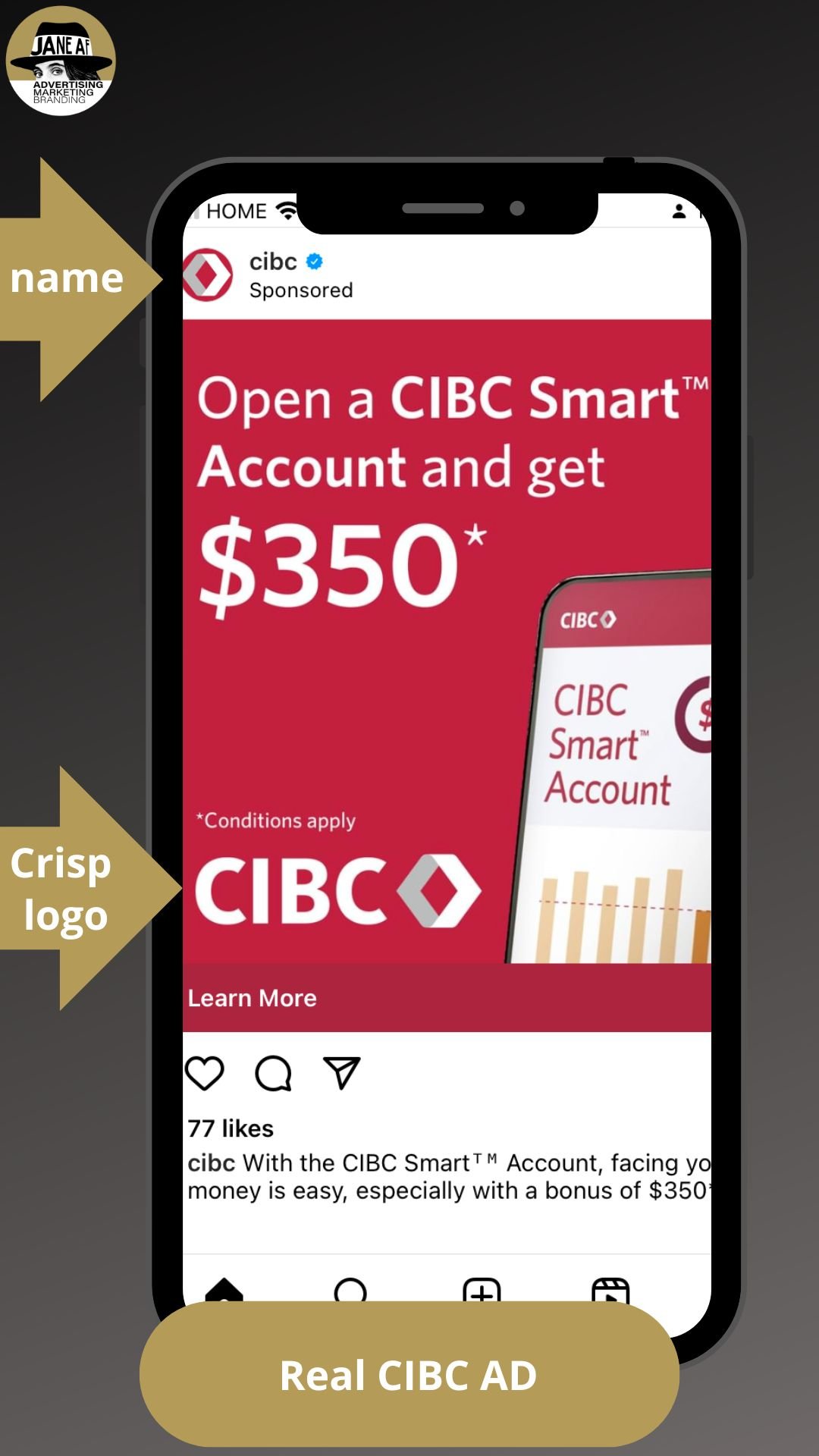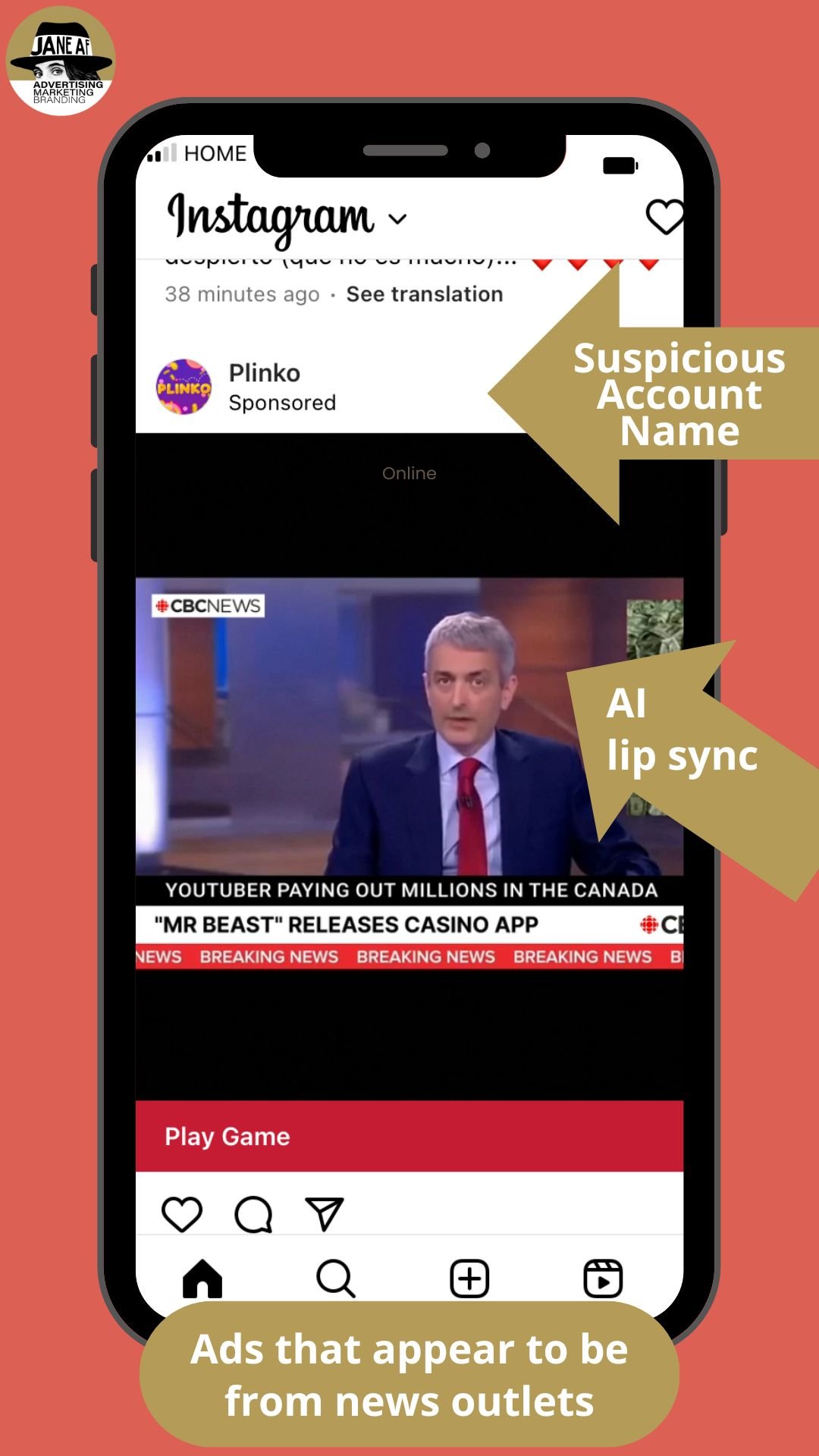by Jane Friedmann
The rise of fake ads on social media is astonishing. Lately, it seems that 1/4 of the paid ads that come up on my Facebook and Instagram feeds are false. The aim of these scams is to collect personal data such as your name, email address, and sometimes even more secure information like your birthdate, home address and even banking information! The rise of AI has only bolstered their sophistication, with deep fakes of celebrity voices to almost near website cloning.
So far, Meta (Facebook/Instagram) has not been able to keep up with many of these types of new scams. Each time I’ve reported false ads, I’ve noticed that the Meta support team always responds with messages like “Our review team found that the advertiser ad does not go against our Community Guidelines of Impersonation.” and then leaves the ads up and running. These frustrating situations have made me realize that it’s up to us to look out for deep fakes, phishing scams and false ads and to protect our personal information. In this blog, I’ve created a list of the top tells for fake ads so that you can stay alert and keep your online information safe.
1. Pay Attention to the Account Name
Ads on Facebook and Instagram come from an associated account. Your first trick for evaluating whether the ad is real or not is to check if the account name of the advertiser matches the name of the business. Recently, I saw an Instagram ad advertising that Walmart was hiring, but when I looked at the social media account name of the advertiser, it didn't come from Walmart, but a rather random @World2 account. Furthermore, when I clicked on the account name, it led me to their profile page where I could see them listed as a video game with only 7 followers. This is a big hint that the ad is not coming from the official Walmart retailer but from an impersonator trying to gather your personal information. Being a major company, Walmart has their own @walmart social media account, so another way to verify whether a post is real is to go to Walmart's profile page and see if the ad appears there. A fake job ad is a particularly scary scam as those applying are often highly motivated in their job search and might be prone to glossing over these checks. It’s also alarming because of the sheer amount of personal details a regular job application usually asks for.
2. Look Closely at the Logo
High-resolution company logos are hard to find on the internet. As such, you can usually tell that an ad is a scam because the logo on it appears fuzzy or blurry. Sometimes a scammer will try to recreate a well-known company’s logo. Luckily, large companies usually use proprietary fonts in creating their logos, which makes them difficult to replicate accurately.
3. Check the Click-through URL
If you're unsure about the logo, and the account name looks legit, the next step is to click on the ad and check the URL. Compare this against the company URL you find when searching in Google. Here’s an example of a very sophisticated Bay Department Store clone. As you can see, the impersonator has gone the extra mile and created a full alternate website. The photos and sale items look legit but look at the website URL and it reads, “www.thebaysale.com” compared to the true Bay Department Store URL www.thebay.com, and their sales page URL which is www.thebay.com/c/sales
The account name for this impersonating ad is @onlinesale while the real Bay Department Store account is @hudsonsbay. Furthermore, the header logo on the impersonating website is blurry, whereas the logo on the genuine bay website looks nice and crisp. As I mentioned before, that's your first giveaway that this is a fake account or a scam.
Pictured:
Fake Hudson’s Bay “The Bay” Instagram Ad.
Fake “clone” website
Genuine Hudson’s Bay “The Bay” website for compairison.
Food for thought: Does The Bay even sell Stanley cups? I checked and they do not!
4. Is the Offer Too Good to be True?
A recent phishing scam that came up on my feed suggested that it was from Canadian Bank CIBC. The ad claimed to be offering $200 to participate in a survey, and it was open “only to CIBC members”. Now, I am not a CIBC member, but I tried out the survey anyway. After a few short basic questions, a screen popped up asking me to enter the account details for where I wanted the $200 to be deposited. This scam is especially scary because it's filtering folks by which bank they belong to, and asking straight up for their login details! Be vigilant!
Pictured:
Fake CIBC ad
Scam survey link
Genuine CIBC Instagram ad for reference and comparison.
5. Are Their Lips Moving?
Deep fakes of celebrity endorsements have been on the rise for some time now. The latest one I saw on my Instagram was a fake promotion of a partnership between famed actress Jennifer Garner and cookware giant Le Creuset. The promotion claims to be offering participants free cookware sets and I have to say, as a Le Creuset fan, I did a double take. While most fake ads I've seen are static photos, this scam was a considerable elevation as a video with a voiceover that genuinely sounds like Jennifer Garner! The tell? Her lips didn’t align. While the video showed clips of Jennifer Garner speaking, it was clear to see that the words the real actress was saying didn't match the deep fake voiceover. In addition, the ad came from an account called @SportsManiacs which does not seem linked to either @Jennifer.Garner or @LeCreuset, in line with point 1.
Fake social media ad
6. How are their lips moving?
Wait, didn't I just ask, are their lips moving? Well it turns out, for some scams that still isn't enough. AI lip syncing is on the rise with playful apps like https://gooey.ai/Lipsync/ that add lip-synched speech to AI-generated video clips, but this technology also has a dark side. I recently took a screenshot of a video ad that appears to be from Canadian News Channel CBC. The script was a broadcast about how Canadians can make millions using a new app. How could I tell it was a scam? Honestly at first just because news sites are banned from Meta (Facebook/Instagram) in Canada. Then I heard the impersonating voiceover mispronounce a word, which a professional news anchor is unlikely to do. My curiosity piqued, I looked more closely at the newscaster’s lips and I could see the AI animation. Admittedly, on a small mobile screen it was difficult to tell the mouth movements were AI, I had to zoom in and really focus on their lips. This is an advanced scam!
AI generated fake ad.
7. Read the Comments
Hint: they're usually turned off. While genuine social media ads let you post and read comments, fake impersonators usually turn this option off. Presumably to avoid concerned citizens warning the community.
8. When in Doubt, Check Reddit
Reddit is the go-to online community when it comes to calling out scams. Have you ever had a specific problem whose solution you went online to find? You would scour websites and find nothing useful until a very similar problem to yours came up on a Reddit search result, oftentimes with the answer you were looking for. That's the beauty of community forums like Reddit. People go there to find others with similar concerns, issues or interests. It's gotten so useful for me that sometimes when I search about a very specific issue, I add "Reddit" to the end of my search history to prioritize getting Reddit results. This type of popularity makes Reddit the go-to online community for calling out scams. If there's a scam going on, someone on Reddit has probably posted about it. So it's best to check there if an ad looks suspicious to you.
9. AI Means Scams are Getting More Sophisticated
Fake ads have always been a problem online, but their sophistication is only going to increase with the rise of AI. Most users can't rely on social media platforms whose algorithms are struggling to identify or stop these accounts. If a celebrity promotion catches your eye, make the mental note to always double-check if it's legit. If it's a brand you trust, take a closer look at the account, the deal may probably be too good to be true. It falls to social media users and consumers to spot, report, raise awareness about fake ads and warn others to not engage with them. The lip sync scam, along with the clone websites are particularly advanced. To be ultimately safe, I might suggest only making online purchases directly from known websites you trust, and not from ads, even if it appears to be a large brand like The Bay or a known celebrity like Jennifer Garner.











